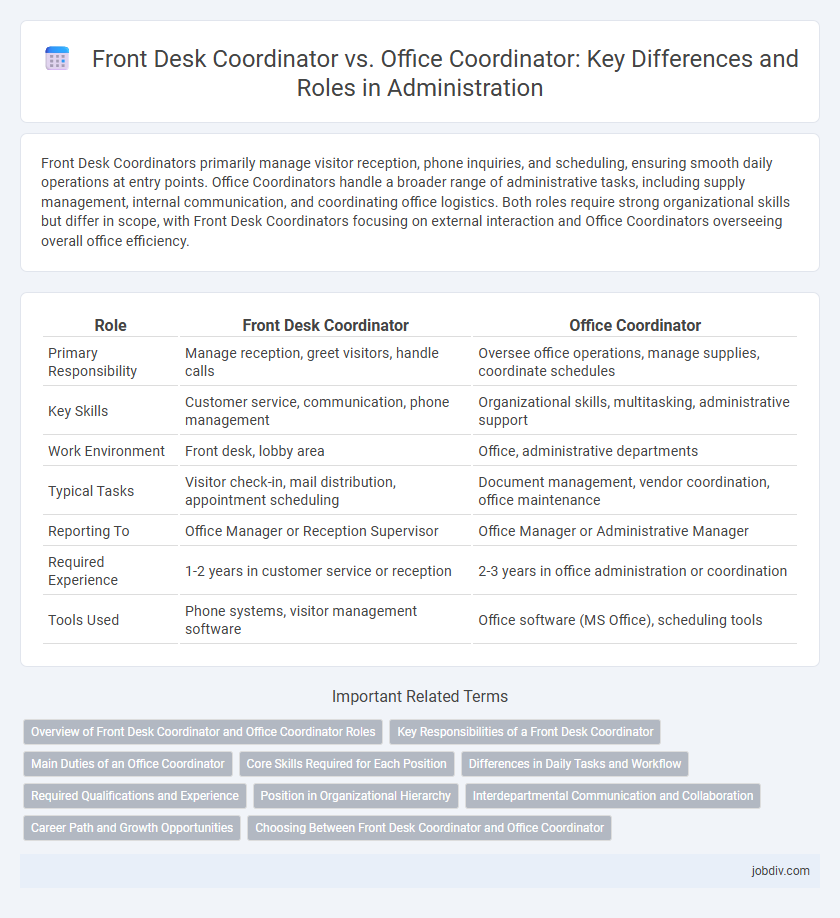Front Desk Coordinators primarily manage visitor reception, phone inquiries, and scheduling, ensuring smooth daily operations at entry points. Office Coordinators handle a broader range of administrative tasks, including supply management, internal communication, and coordinating office logistics. Both roles require strong organizational skills but differ in scope, with Front Desk Coordinators focusing on external interaction and Office Coordinators overseeing overall office efficiency.
Table of Comparison
| Role | Front Desk Coordinator | Office Coordinator |
|---|---|---|
| Primary Responsibility | Manage reception, greet visitors, handle calls | Oversee office operations, manage supplies, coordinate schedules |
| Key Skills | Customer service, communication, phone management | Organizational skills, multitasking, administrative support |
| Work Environment | Front desk, lobby area | Office, administrative departments |
| Typical Tasks | Visitor check-in, mail distribution, appointment scheduling | Document management, vendor coordination, office maintenance |
| Reporting To | Office Manager or Reception Supervisor | Office Manager or Administrative Manager |
| Required Experience | 1-2 years in customer service or reception | 2-3 years in office administration or coordination |
| Tools Used | Phone systems, visitor management software | Office software (MS Office), scheduling tools |
Overview of Front Desk Coordinator and Office Coordinator Roles
Front Desk Coordinators manage visitor interactions, handle incoming calls, and maintain appointment schedules to ensure smooth daily operations at the reception area. Office Coordinators oversee office functions including supply management, internal communication, and support for administrative staff, enhancing overall workplace efficiency. Both roles require strong organizational skills and effective communication but differ in scope, with Front Desk Coordinators focusing on external engagement and Office Coordinators on internal office management.
Key Responsibilities of a Front Desk Coordinator
A Front Desk Coordinator manages all visitor interactions, including greeting guests, answering phone calls, and scheduling appointments to ensure smooth daily operations. They oversee mail distribution, maintain security protocols by monitoring access, and manage the front office supplies and equipment. This role emphasizes customer service excellence and efficient communication between visitors and internal departments.
Main Duties of an Office Coordinator
An Office Coordinator manages daily administrative operations, ensuring smooth workflow by overseeing schedules, handling correspondence, and maintaining office supplies. They coordinate communication between departments, support staff with logistical needs, and organize meetings or events. By optimizing office efficiency, Office Coordinators play a crucial role in sustaining organizational productivity.
Core Skills Required for Each Position
Front Desk Coordinators require exceptional communication skills, multitasking abilities, and proficiency in handling customer inquiries, appointments, and visitor management systems. Office Coordinators need strong organizational skills, experience in managing office operations, scheduling, and coordinating between departments, as well as proficiency with office software and administrative procedures. Both roles demand attention to detail and problem-solving capabilities, but Front Desk Coordinators focus more on front-line customer interaction while Office Coordinators emphasize internal office workflow and support.
Differences in Daily Tasks and Workflow
A Front Desk Coordinator primarily manages visitor reception, appointment scheduling, and phone call handling, ensuring smooth first-point-of-contact operations. An Office Coordinator oversees broader administrative duties including office supply management, staff support, and coordinating internal communications to maintain overall office efficiency. The workflow of a Front Desk Coordinator is more customer-facing and reactive, while an Office Coordinator follows a proactive, organizational approach to optimize daily office functions.
Required Qualifications and Experience
A Front Desk Coordinator typically requires strong customer service skills, proficiency in phone and email communication, and experience with scheduling software or visitor management systems. An Office Coordinator demands broader qualifications such as office administration, multitasking ability, and familiarity with bookkeeping or inventory management, often requiring 2-3 years of administrative experience. Both roles benefit from proficiency in Microsoft Office Suite and excellent organizational skills, but Office Coordinators usually need more advanced project management capabilities.
Position in Organizational Hierarchy
The Front Desk Coordinator typically occupies an entry-level position within the administrative hierarchy, responsible for managing visitor interactions and basic office tasks. The Office Coordinator holds a mid-level role, overseeing broader administrative functions, coordinating office activities, and supporting departmental operations. Organizationally, the Office Coordinator reports to senior management, while the Front Desk Coordinator usually reports to the Office Coordinator or an administrative supervisor.
Interdepartmental Communication and Collaboration
Front Desk Coordinators serve as the primary point of contact, managing visitor interactions and efficiently directing inquiries to appropriate departments, which ensures smooth interdepartmental communication. Office Coordinators oversee broader administrative functions, coordinating schedules, resources, and cross-departmental workflows to facilitate collaboration across teams. Their complementary roles enhance organizational efficiency by streamlining information flow and fostering seamless cooperation among various departments.
Career Path and Growth Opportunities
Front Desk Coordinators often begin their careers managing visitor interactions and basic administrative tasks, making it an entry-level position with opportunities to develop customer service and organizational skills. Office Coordinators typically have broader responsibilities, overseeing office operations and supporting multiple departments, which positions them for advancement into administrative management roles such as Office Manager or Operations Supervisor. Career growth for Front Desk Coordinators can lead to Office Coordinator roles, while Office Coordinators may progress into higher-level administrative or executive assistant positions, reflecting increased leadership and strategic planning capabilities.
Choosing Between Front Desk Coordinator and Office Coordinator
Choosing between a Front Desk Coordinator and an Office Coordinator depends on the scope of responsibilities and organizational needs. A Front Desk Coordinator primarily manages reception duties, visitor interactions, and communication flow, while an Office Coordinator oversees broader administrative tasks, including office management, supply coordination, and staff support. Evaluating the complexity of administrative operations and the need for multitasking determines the ideal role for efficient office administration.
Front Desk Coordinator vs Office Coordinator Infographic

 jobdiv.com
jobdiv.com